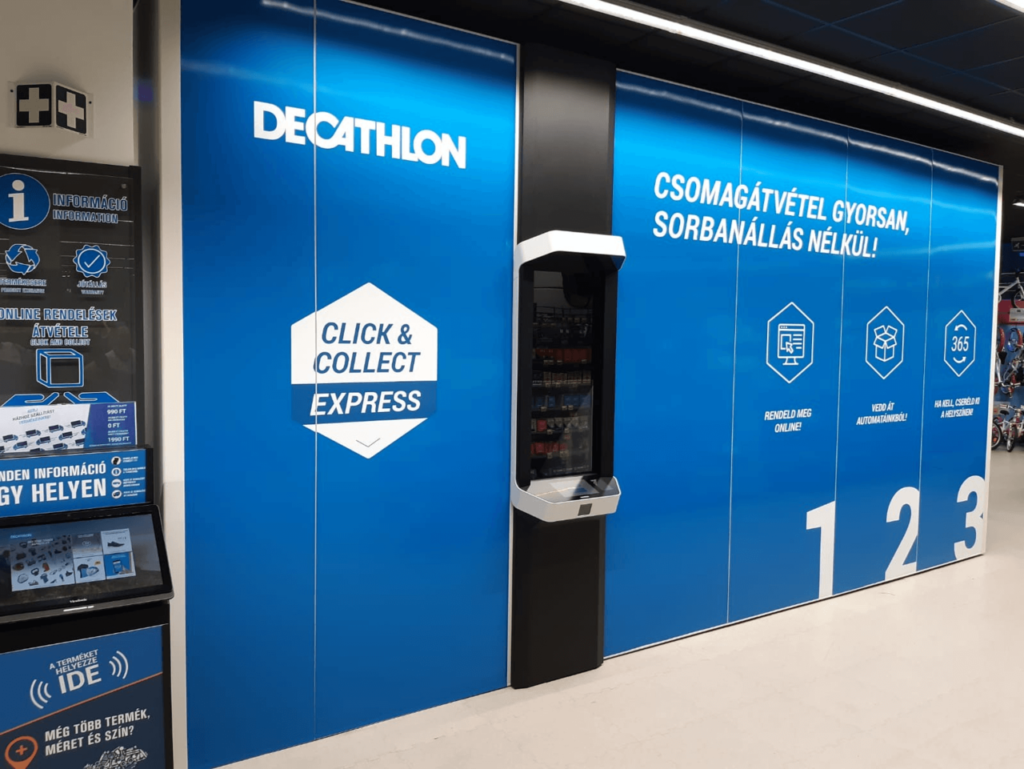Decathlon, the world’s largest sports retailer, is investing in parcel lockers for click-and-collect. Has Decathlon eliminated its last mile costs? Analysis from Ian Kerr (Postal Hub Podcast) and Marek Różycki (Last Mile Experts)
When the world’s largest sporting goods retailer starts heavily investing in in-store parcel lockers, then you know that APM click-and-collect has come of age.
Decathlon, with 1,500 stores worldwide, recently signed deals with Cleveron and Cubee (part of Belgium’s bpost) to install parcel lockers for click and collect.
Cleveron’s lockers have already been deployed by Decathlon’s Hungarian branch. According to Decathlon Hungary’s online marketing director Gergely Román, the total number of parcels ordered via its online store has grown by 40% in one year.
In Belgium, Decathlon is introducing parcel lockers from Cubee at 12 stores across the country by the end of 2019. The Cubee lockers will also be able to accept returns from selected other retailers.
Belgian shoppers can select the Cubee lockers as a click-and-collect option at checkout. When their order is delivered to the locker, customers will receive and email or SMS with a QR code that can be scanned to open the locker.
Other retailers offering in-store parcel lockers
American retail giant Walmart uses Cleveron’s PackRobot – dubbed the Pickup Tower – as its click-and-collect solution. Walmart is investing in integrating e-commerce and its in-store experience to grow both its e-commerce offering and sales in its bricks-and-mortar network. According to a study, some 50% of Walmart click-and-collect customers shopped at the store and bought more items.
Are last-mile costs eliminated?
Lockers don’t actually eliminate last-mile costs, but are almost always cheaper than humans where APMs reach 60+% utilization, unless they are particularly expensive models and/or have unusually high rental/operating costs.
More importantly, most studies show that they have good customer acceptance and avoid queues or hassles, once the customer has learned how to use them.
“Queuing in the store to get a parcel makes for a negative customer experience – first you have to wait until it is your turn at the service desk and then wait again until the store associate finds your parcel,” says Cleveron CEO Arno Kütt. According to Kütt, customers can retrieve their purchases from lockers in just seconds.
Of course, when lockers are an alternative to ‘to door’ delivery, they offer significant savings as typical drops will be in the region of 40+ parcels versus the average of about 1.2 to a consignee (home) address.
More retailers will follow suit
Decathlon is right to look at lockers as research shows that customers like the convenience and reliability the machines offer. An APM will not have an ‘off day’ or tea break, and queues are generally small or non-existent due to the efficiency of the collection process.
Another key advantage of store-based lockers is the ability to offer goods out of hours and to accept returns hassle-free, when compared with needing to re-pack for shipping, book a courier or go to the post office.
Finally, lockers are a great way to serve online sales for a bricks-and-mortar retailer like Decathlon, whose stores have good access and parking facilities. Where APMs are outside and have 24/7 availability, things look even better.
However, store-based lockers do have some drawbacks. While they will be able to handle many sporting items, such as shoes and apparel, larger items such as kayaks, skis or bicycles ordered online for in-store collection will still need to be collected at the counter. Another potential disadvantage is the cost where they are under-utilized.
Whichever way we look at it, lockers are a great asset to bricks-and-mortar retail and will be increasingly evident. Recent moves by Lidl and Biedronka (Poland’s leading discounter, with almost 3,000 stores) to offer APMs would seem to confirm this.
Ian Kerr will moderate the conference workshops PUDOs & Lockers: the New Power in the Last Mile and Social Media & Communications at Parcel+Post Expo Conference 2019. Marek Różyck will moderate the panel Intelligent Self-Service Solutions and the PUDOs & Lockers: the New Power in the Last Mile workshop.




